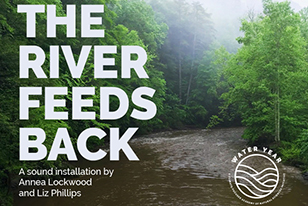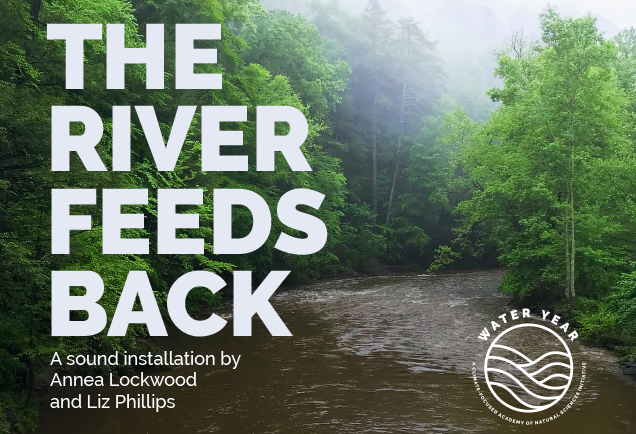The River Feeds Back
June 1–October 30, 2022


The Lenni Lenape call the Schuylkill River the Ganshowahanna, or roaring waters, for its noisy course over rocks and stones, and the Wissahickon Creek the Wisameckhan, or cat-fish stream. In The River Feeds Back, you can traverse these aquatic environments through an immersive sound installation created by artists Annea Lockwood and Liz Phillips.
Recorded at sites along the 135 miles of the Schuylkill River from its headwaters to its mouth, this layered sound map offers glimpses of the river system above and below the water’s surface through a variety of listening portals made of wood, slate and clay pottery. Experience swirling currents, water slipping and rushing over rocks, the underwater lives of aquatic insects and fish, trumpeting geese crashing into water, chirping birds, cheeping frogs, and the long, slow sweeps of toad calls. The River Feeds Back attunes us to the life-giving waterways of the Schuylkill, vital sources of water for Philadelphia.
The River Feeds Back is a companion piece to Lockwood and Phillips’ outdoor installation, Inside the Watershed on the Schuylkill River Trail, in which passersby can experience a live feed from the river as well as a sound composition. Both projects are presented as part of Watershed Moment: How to Get to the River, an art adventure walk (opening August 3, 2022). Both works have been created as part of Water Year 2022, a yearlong celebration and investigation of water designed to inspire a more intimate connection with our local waterways and the vital need to protect them.
All exhibits are included with the purchase of a general admission ticket.

Members receive free admission to The River Feeds Back. Not a member? Join now!
Current members, check out the Members’ Guide for more information about your admission benefits.
How to Get to the River is part of Watershed Moment, the signature artwork of the Academy’s Water Year celebration that provides fresh perspectives on the water systems that bind us together. Centered around the importance of watershed thinking in our lives, Watershed Moment is designed to inspire a greater connection with our local waterways and the vital need to protect them.
About the Artists
Annea Lockwood
Since 1970 Annea Lockwood has recorded rivers in many countries, not to document them, but rather for the special state of mind and body that the sounds of moving water create when one listens intently to the complex mesh of rhythms and pitches. Each stretch of a river has its own sonic texture, formed by the terrain and varying according to the weather, the season and, downstream, the human environment, the sounds of which are intimately woven into the river’s sounds.
“With bringing rivers into an urban environment through sound, I’ve long hoped to convey the experience of that sound as a nourishing form of energy. And perhaps indirectly, over time, the experience becomes real, concrete, immediate, close up. Perhaps that person will slowly be able to empathize or understand more, even take steps politically and socially to preserve the phenomenon. My process is really indirect but it is direct.” – Annea Lockwood
Liz Phillips
For the past 50 years, Queens-based artist Liz Phillips has been making interactive multi-media installations that combine audio and visual forms with new technologies to create interactive experiences. Phillip created the interactive approach for The River Feeds Back installation – developing the system and method for orbiting the sounds and location recordings throughout the space of the Academy’s Dietrich Gallery and using sculptural objects to create a visceral experience of the river sounds resounding throughout the space.
Phillips’ work has been exhibited around the world at art museums, alternative spaces, festivals, and public spaces, including the Queens Museum, the Whitney Museum of American Art, Lincoln Center, the Milwaukee Art Museum, the Spoleto Festival USA, the Walker Art Center, Ars Electronica, The Kitchen, Creative Time, and the Stedelijk Museum Amsterdam.
The River Feeds Back has been supported by The Pew Center for Arts & Heritage.